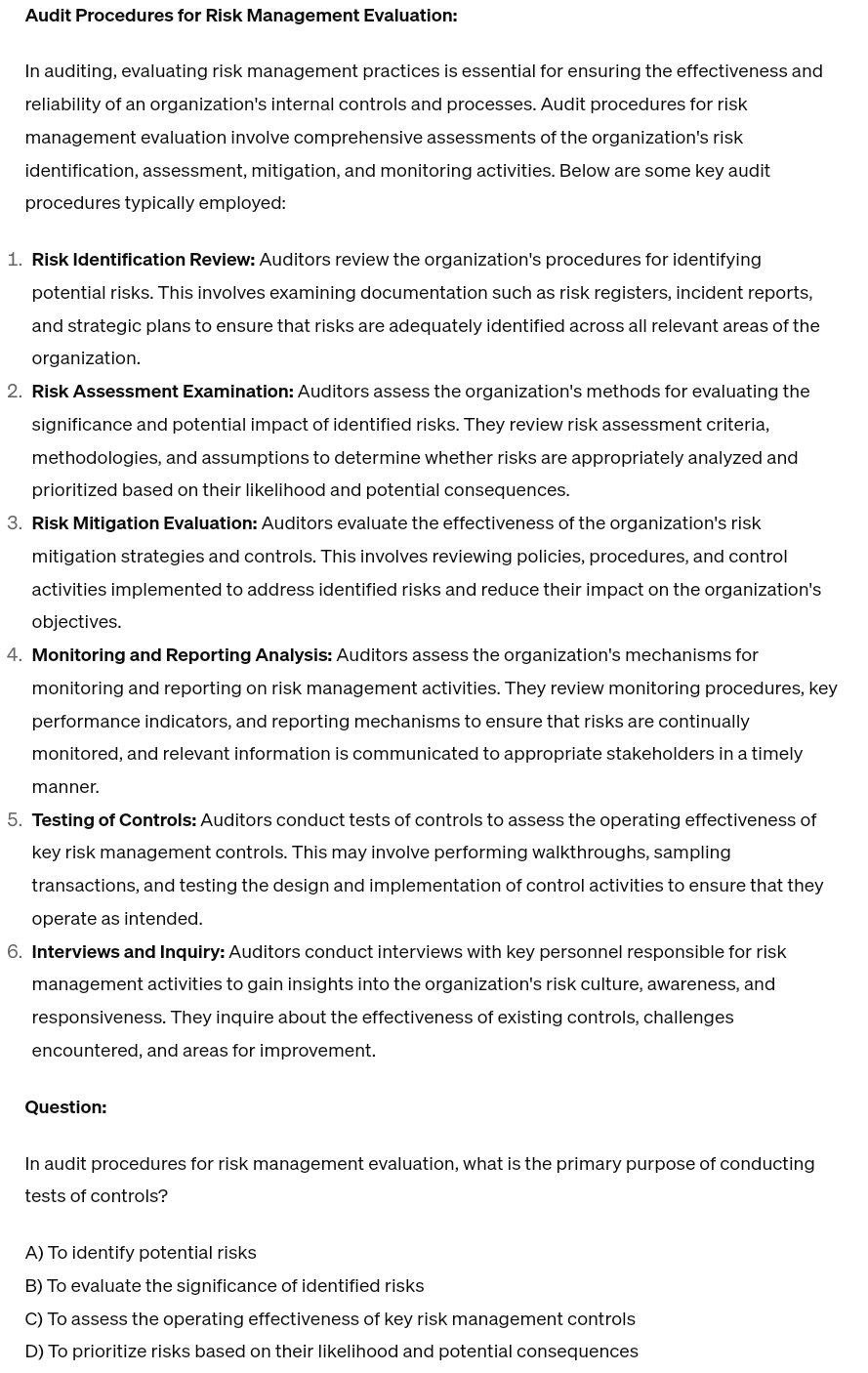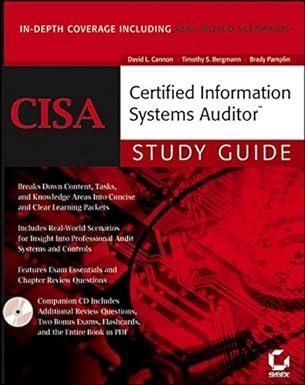Answered step by step
Verified Expert Solution
Question
1 Approved Answer
Audit Procedures for Risk Management Evaluation: In auditing, evaluating risk management practices is essential for ensuring the effectiveness and reliability of an organization's internal controls
Audit Procedures for Risk Management Evaluation: In auditing, evaluating risk management practices is essential for ensuring the effectiveness and reliability of an organization's internal controls and processes. Audit procedures for risk management evaluation involve comprehensive assessments of the organization's risk identification, assessment, mitigation, and monitoring activities. Below are some key audit procedures typically employed: Risk Identification Review: Auditors review the organization's procedures for identifying potential risks. This involves examining documentation such as risk registers, incident reports, and strategic plans to ensure that risks are adequately identified across all relevant areas of the organization. Risk Assessment Examination: Auditors assess the organization's methods for evaluating the significance and potential impact of identified risks. They review risk assessment criteria, methodologies, and assumptions to determine whether risks are appropriately analyzed and prioritized based on their likelihood and potential consequences. Risk Mitigation Evaluation: Auditors evaluate the effectiveness of the organization's risk mitigation strategies and controls. This involves reviewing policies, procedures, and control activities implemented to address identified risks and reduce their impact on the organization's objectives. Monitoring and Reporting Analysis: Auditors assess the organization's mechanisms for monitoring and reporting on risk management activities. They review monitoring procedures, key performance indicators, and reporting mechanisms to ensure that risks are continually monitored, and relevant information is communicated to appropriate stakeholders in a timely manner. Testing of Controls: Auditors conduct tests of controls to assess the operating effectiveness of key risk management controls. This may involve performing walkthroughs, sampling transactions, and testing the design and implementation of control activities to ensure that they operate as intended. Interviews and Inquiry: Auditors conduct interviews with key personnel responsible for risk management activities to gain insights into the organization's risk culture, awareness, and responsiveness. They inquire about the effectiveness of existing controls, challenges encountered, and areas for improvement. Question: In audit procedures for risk management evaluation, what is the primary purpose of conducting tests of controls? A To identify potential risks B To evaluate the significance of identified risks C To assess the operating effectiveness of key risk management controls D To prioritize risks based on their likelihood and potential consequences 
Audit Procedures for Risk Management Evaluation:
In auditing, evaluating risk management practices is essential for ensuring the effectiveness and reliability of an organization's internal controls and processes. Audit procedures for risk management evaluation involve comprehensive assessments of the organization's risk identification, assessment, mitigation, and monitoring activities. Below are some key audit procedures typically employed:
Risk Identification Review: Auditors review the organization's procedures for identifying potential risks. This involves examining documentation such as risk registers, incident reports, and strategic plans to ensure that risks are adequately identified across all relevant areas of the organization.
Risk Assessment Examination: Auditors assess the organization's methods for evaluating the significance and potential impact of identified risks. They review risk assessment criteria, methodologies, and assumptions to determine whether risks are appropriately analyzed and prioritized based on their likelihood and potential consequences.
Risk Mitigation Evaluation: Auditors evaluate the effectiveness of the organization's risk mitigation strategies and controls. This involves reviewing policies, procedures, and control activities implemented to address identified risks and reduce their impact on the organization's objectives.
Monitoring and Reporting Analysis: Auditors assess the organization's mechanisms for monitoring and reporting on risk management activities. They review monitoring procedures, key performance indicators, and reporting mechanisms to ensure that risks are continually monitored, and relevant information is communicated to appropriate stakeholders in a timely manner.
Testing of Controls: Auditors conduct tests of controls to assess the operating effectiveness of key risk management controls. This may involve performing walkthroughs, sampling transactions, and testing the design and implementation of control activities to ensure that they operate as intended.
Interviews and Inquiry: Auditors conduct interviews with key personnel responsible for risk management activities to gain insights into the organization's risk culture, awareness, and responsiveness. They inquire about the effectiveness of existing controls, challenges encountered, and areas for improvement.
Question:
In audit procedures for risk management evaluation, what is the primary purpose of conducting tests of controls?
A To identify potential risks
B To evaluate the significance of identified risks
C To assess the operating effectiveness of key risk management controls
D To prioritize risks based on their likelihood and potential consequences
Step by Step Solution
There are 3 Steps involved in it
Step: 1

Get Instant Access to Expert-Tailored Solutions
See step-by-step solutions with expert insights and AI powered tools for academic success
Step: 2

Step: 3

Ace Your Homework with AI
Get the answers you need in no time with our AI-driven, step-by-step assistance
Get Started


